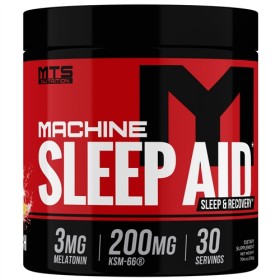
Get Better Sleep With GABA, Ashwagandha, and Melatonin
The amount of quality deep sleep you get per night determines your physical and mental capacity.
If you don't get enough sleep, you're going to struggle in school, work, and the gym. Since our lives are busy, we cannot get seven or more hours of sleep per night that we need.
This is why Machine Sleep Aid was created.
The breakthrough formula includes GABA, ashwagandha, and melatonin. This trifecta of ingredients works together to enhance your quality of sleep. This means the hours you do sleep will be deep, quality sleep time.
Sleep Better With These 3 Supplements
[caption id="attachment_55411" align="alignright" width="280"] Click here to order Machine Sleep Aid now.[/caption]
Click here to order Machine Sleep Aid now.[/caption]#1 - GABA
Gamma Animobutyric Acid (GABA) helps to regulate the depressive and sedative actions in the human brain; essential for relaxation.GABA works by reducing neuronal excitability throughout your nervous system.
It also is responsible for the regulation of muscle tone. It works to counterbalance glutamate, the primary excitatory neurotransmitter in the brain.
Taken by mouth, GABA relieves anxiety, improves mood, and reduces symptoms of PMS. GABA also treats ADD, promotes lean muscle growth, burns fat, stabilizes blood pressure, and relieves pain.
Healthy adults with insomnia often have reduced levels of GABA. The process of sleeping involves inhibiting many functions, including senses and voluntary muscles. Insomnia patients, usually with anxiety and depression issues, lack the central inhibitory process that GABA provides.
GABA's effects can be seen within one hour of administration, effectively working as a natural relaxant and diminishing anxiety. Under stress conditions, GABA can enhance immunity, which is important to staying healthy and prevent overtraining.
It is synthesized directly from the excitatory neurotransmitter glutamate via the enzyme glutamate decarboxylase and can be reverse transformed to glutamate via the tricarboxylic acid cycle.
MTS Sleep Aid is here! Deep sleep, improved recovery.The blood brain barrier's efflux rate for GABA is approximately 16 times as potent as the uptake rate, and is activated during periods of excessive GABA concentrations in neurological tissue as to prevent excessive depressive effects.
GABA influences growth hormone secretion. In fact, there are two analogues of growth hormone affected; Immunoreactive GH (irGH), and Immunofunctional GH (ifGH).
It is worth noting that these levels change with resistance exercise. These effects may be due to the exercise-induced Nitric Oxide that seems to increase the blood brain barrier permeability of GABA.
GABA improves exercise tolerance and decreases body fat, giving you the edge you need in your fitness journey.
#2 - Ashwagandha
Ashwagandha is an exotic Indian herb that has stress-relieving properties comparable to those of powerful drugs used to treat depression and anxiety. It has also been a promising alternative treatment for a variety of diseases such as Alzheimer's and Parkinson's.Ashwagandha seeks and destroys the free radicals that have been implicated in aging and multiple disease states. It has been shown to have anti-cancer benefits as well as many protective effects on the nervous system.
Ashwagandha is suggested to have similar effects to tranquilizers and antidepressant prescription drugs. Along with these effects, Ashwagandha is alleviates symptoms of stress, fatigue, lack of energy, and difficulty concentrating. it's rejuvenating and sense of wellbeing is highly sought after.
This ancient plant decreases pain and swelling, prevents the effects of aging, and can increase fertility and libido in both men and women.
The name Ashwagandha, as hard as it is to spell, comes from the Sanskrit language. Broken down, Ashva (meaning horse) and gandha (meaning smell) adequately describes the root?s strong horse-like smell.
It has been used in Ayurvedic, Indian, and Unani medicine. Some describe it as an ?Indian gensing? and has been used in traditional African medicine for a variety of ailments.
Ashwagandha is an adaptogen and it has been supplemented primarily for its ability to reduce and prevent anxiety. It can significantly reduce cortisol concentrations, and can reduce the immunosuppressive effects of stress.
Beyond its ability to reduce stress, Ashwagandha improves physical performance in both athletes and sedentary individuals. It reduces LDL cholesterol and improves the formation of memories.
While it is unknown if Ashwagandha treats cancer, it is a great supplement to reduce immunosuppression. It also eases the pain of chemotherapy by reducing fatigue and stress.
#3 - Melatonin
Melatonin is a natural hormone in our body that helps maintain our wake-sleep cycle. In humans, this averages to 16 hours of daytime activity and 8 hours of nighttime sleep.Endogenous melatonin release is increased each day when the sun sets, peaking between 11PM and 3AM. Our nighttime melatonin levels are about 10 times higher than in the daytime. The rise and fall of this wake-sleep cycle is also known as our circadian rhythm.
Melatonin?s most commonly used for:
- Helping decrease jet lag
- Helps shift-work disorders in people with alternating work schedules
- Adjusting sleep cycles
- General insomnias
Melatonin sends messages to the melatonin receptor agonist in the brain and helps control our wake and sleep cycles.
Melatonin is by far the best known natural remedy for sleep. Many people try a more natural approach to getting a more restful night?s sleep such as melatonin before they take pharmaceutical drugs.
Caffeine, tobacco, and alcohol all can lower the levels of melatonin in our bodies, disrupting our sleep cycle. Blue light emitted by TV screens, computers, and handheld devices also suppress our melatonin levels.
Some foods that can naturally increase levels of melatonin production include:
- Oats
- Bananas
- Turkey
- Tart Cherries
- Walnuts
- Pineapple
- Barley
Melatonin has also been used as a sleep aid after discontinuing the use of benzodiazepine drugs and helps reduce the side effects of quitting smoking.






